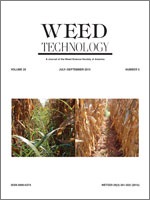The increasing use of ACCase-inhibiting herbicides has resulted in evolved resistance in key grass weeds infesting cereal cropping systems worldwide. Japanese foxtail is one of the most important grass weed species in wheat in China. Most populations have evolved resistance to fenoxaprop-p-ethyl, which is one of the most common ACCase-inhibiting herbicides in wheat. The seeds of two Japanese foxtail populations were collected from wheat fields where farmers complained that control could not be effectively obtained with fenoxaprop-p-ethyl. Seeds from one susceptible population were collected from an area along a roadside where ACCase inhibitors had not been used to be used for validating cross-resistance and elucidating the mechanism of resistance. The experimental results showed that the two populations, Aloja-JS10-R1 and Aloja-JS10-R2, expressed high resistance to fenoxaprop-p-ethyl, with resistance indexes (RIs) of 29.2 and 27.9. These populations also expressed high cross-resistance to clodinafop-propargyl with RIs of 12.8 and 14.7, and moderate cross-resistance to clethodim and pinoxaden with RIs ranging from 2.6 to 11.4. Comparison of the ACCase carboxyl-transferase (CT) domain sequences of the susceptible and resistant populations with blackgrass revealed that tryptophan at position 2027 of the ACCase gene was substituted by cysteine in population Aloja-JS10-R1, and isoleucine at position 1781 of the ACCase gene was substituted by leucine in populations Aloja-JS10-R2. The study confirmed Japanese foxtail resistance to the ACCase inhibitor fenoxafop-p-ethyl, cross-resistance to other ACCase inhibitors, and the resistance mechanism being conferred by specific ACCase point mutations at amino acid position 1781 and 2027.
Nomenclature: Clethodim; clodinafop-propargyl; fenoxaprop-p-ethyl; pinoxaden; blackgrass, Alopecurus myosuroides; Japanese foxtail, Alopecurus japonicus; wheat, Triticum aestivum L.
El creciente uso de herbicidas inhibidores de ACCase ha resultado en la evolución de resistencia en especies de malezas gramíneas clave en sistemas de cultivos de cereales en todo el mundo. Alopecurus japonicus es una de las malezas gramíneas más importantes en trigo en China. La mayoría de sus poblaciones han evolucionado resistencia a fenoxaprop-p-ethyl, el cual es uno de los herbicidas inhibidores de ACCase más comunes en trigo. Semillas de dos poblaciones de A. japonicus fueron colectadas en campos de trigo donde los productores se habían quejado que no se había podido alcanzar un control efectivo con fenoxaprop-p-ethyl. También se colectaron semillas de una población susceptible en un área a la orilla de la carretera donde no se había usado inhibidores de ACCase, para validar la resistencia cruzada y elucidar el mecanismo de resistencia. Los resultados experimentales mostraron que las dos poblaciones, Aloja-JS10-R1 y Aloja-JS10-R2, expresaron un alto nivel de resistencia a fenoxaprop-p-ethyl, con índices de resistencia (RIs) de 29.2 y 27.9. Estas poblaciones también expresaron una alta resistencia cruzada a clodinafop-propargyl con RIs de 12.8 y 14.7, y resistencia cruzada moderada a clethodim y pinoxaden con RIs que variaron entre 2.6 y 11.4. La comparación de la secuencia del dominio carboxyl-transferase (CT) de ACCase de las poblaciones susceptibles y resistentes con Alopecurus myosuroides reveló que tryptophan en la posición 2027 del gen ACCase fue sustituido por cysteine en la poblacón Aloja-JS10R1, y isoleucine en la posición 1781 del gene ACCase fue sustituido por leucine en la población Aloja-JS10-R2. Este estudio confirmó la resistencia de A. japonicus al inhibidor de ACCase fenoxaprop-p-ethyl, la resistencia cruzada a otros inhibidores de ACCase, y el mecanismo de resistencia, el cual se debe a mutaciones puntuales en las posici





